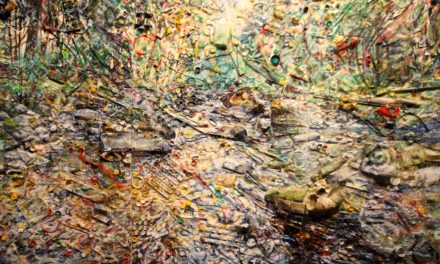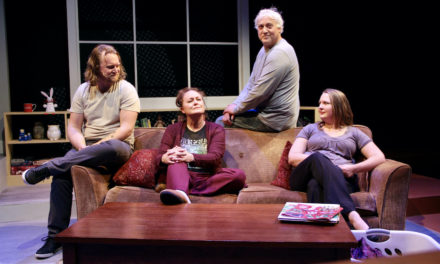By Daniel Buckwalter
Man’s infinite and desperate desire to control the environment around him can be seen in almost any aspect of life, and it has led to many destructive and tearful paths.
One small and distressing reminder of that is on display this weekend at Wildish Community Theater in Springfield with the Eugene Opera’s production of Lucy.
Its’ a one-act monodrama based on the true story of how Dr. Maurice Temerlin, a psychotherapist and professor at the University of Oklahoma, and his wife Jane adopted (stole, really) a baby chimpanzee from its mother in 1964 and attempted for 11 years afterward to domesticate the animal, to make it their “daughter,” before returning the primate — for a short time before its death — to her natural habitat.
The arrogance that propelled the couple to believe it could pull off the feat is not fully explored in the musical except for one line by Temerlin (baritone Andrew Wilkowske), who sings that he has “great satisfaction from breaking away and living an unconventional life.”
But the disastrous results of that “unconventional life” are fully evident from the start.
The opera begins and ends in 1987 with the news of Lucy’s death in the wild where she belonged but which she hardly knew. Temerlin, a broken man by this time, sings of the hope that was in the air in at the start as Jane returned with infant Lucy, torn after her birth from her drugged mother.
What follows is years of dress up, of grueling lessons to Lucy on how to use silverware, how relate to people and other animals (cats, in particular) and sign language, as well as stories about how family and friends eventually began to distance themselves from the Temerlin household. Even babysitters were hard to come by as Lucy grew.
All things were reasonably well at outset before they were not.
Lucy threw her feces, ripped furniture and knocked books off shelves. There was patience and love on the part of the Temerlins.
But Lucy would kill two cats and attack a guest as she grew older. Upon attacking the guest, a dear friend, Temerlin laments that “I hated Lucy at that moment.”
Yet Lucy was her true self, a creature born for the wild who was forced into suburbian confinement except for trips to a ranch the family bought, a place where she could explore and show a touch of her physical grace from time to time.
And through the sign language she was taught, Lucy tried to explain this to Temerlin. One poignant scene in the opera has Lucy tearing up a banana tree in the house leaf by leaf.
Temerlin is upset, and he’s showing it. Lucy senses that and signs, “I am Lucy.”
She knew that, and why Temerlin and his wife couldn’t comprehend that for more than a decade — until Lucy grew far too combustible for a suburban life — is a mystery to me. I had no sympathy for him.
The Temerlin character is the only one who sings in the 65-minute production. The only other character in the opera is that of Janis Carter, the scientific assistant who stoically — clinically, even — offers a spoken-word timeline and facts about chimpanzees.
She is played by Olivia Marie Jones, and the Carter character was the one I found who was forthright about the indignities that Lucy suffered while being trained to be human, something that should never have happened.
Lucy has a matinee performance on Sunday, Sept. 26, at 2:30 p.m. at Wildish Theater, 630 Main Street in Springfield.
I encourage people to see it, if only to remember man’s infinite and desperate desire to control the environment around him, and how it destroyed one life, Lucy’s.







